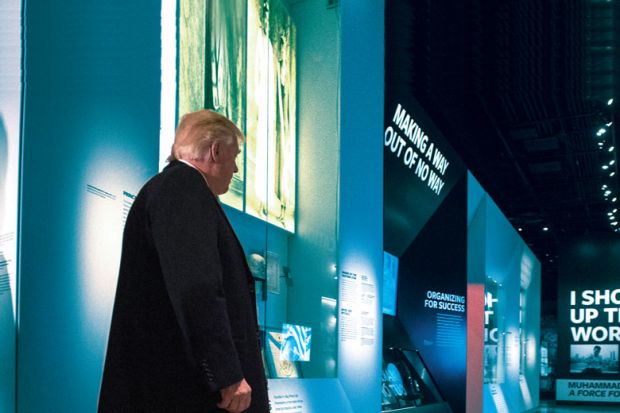It would seem as if the Trump era has been especially bad for the humanities.
Sure, in the years before 2016 there was constant worry about “the crisis in the humanities”, with the disciplines’ supposed descent into jargon, specialisation and obscurity. Undergraduate enrolments fell. Literature and language departments closed. Even President Obama, a former law professor and a real intellectual, questioned the value of art history, and the National Endowment for the Humanities’ appropriation remained flat, even after a big drop in the mid-1990s.
Yet there was never a plan to shut the whole entity down, as has now become a ritual. It was only when fake news hit that a seismic change seemed to be afoot, one that threatened to change the entire landscape.
All of a sudden, everything was contested. Was there really an audience in that photo or just the appearance of one? Is science ideology or is it method? Is affect more important than fact? These questions sounded uncomfortably like those that humanities professors were training students to ask. Something was wrong, and many who had devoted their careers to teaching and scholarship were confused and dispirited as they watched the rise of white supremacy, climate change denial and alternative communities and truths.
The resonance really hit home when, just before the presidential election, New Yorker staff writer Andrew Marantz profiled Mike Cernovich, an alt-right strategist, who explained that he designed his social media playbook after reading postmodern theory as a student at the University of Illinois. That story is repeated in Marantz’s book, Antisocial, published at the end of last year.
This was almost like the Nazis reading Goethe, except worse. The fact that a murderous dictator happens to love poetry is not necessarily an indictment of the poetry, but here a 21st-century humanities education designed to foster critical thinking had been specifically redeployed to serve cultural destruction, such that every fact was now open to debate. Was this just a bad reading of French philosophy or an urgent wake-up call?
Professors and graduate students couldn’t help but wonder if they were responsible not only for uselessness and economic drain, but for an international crisis threatening democracy and its institutions – not to mention the ecological future of the planet. And, for many academics, it felt like time to give up on criticism and interpretation and embrace the truth.
But as they weighed the possibility of abandoning interpretive methods, constructivist theory and a universe of scholarship opened by poststructuralism, they completely missed the evidence that these critical traditions are among the most valuable tools we have available to us today.
Cernovich’s admission that he relied on what he learned in his undergraduate humanities classes revealed neither the humanities’ frivolity nor their corruption, but their extraordinary power: the power to question assumptions, reframe narratives and undermine foundational truths.
Few of us recognised this power or anticipated its use. Even fewer of us have been willing to embrace it as the uncomfortable evidence of why the humanities are more important now than at any time since they found an institutional home in modern universities. But it is true. Now is not the time to apologise for the way the humanities have been used in the Trump era, but to harness their force.
The humanities teach us not only how to question prevailing assumptions in order to undermine institutions, but also to recognise and question that very move. They show us how to read complex and conflicting narratives; how to analyse the construction of truth claims and how to decipher emotional appeals. These are the skills we all need to manage in a world where conventional sources of authority – like science and history – have been displaced, and where the White House has come to represent democracy’s undoing rather than its possibility.
Giving up on the humanities now would be like giving up on democracy. We know that democracy invites pluralism and argument and opinions with which we might vehemently disagree. But if we stop teaching students how to interpret these competing narratives, we will have entered an era even more threatening than the one we are in now.
It is time for us to reclaim and reinvest in the humanities in order to build a society of individuals able to question those they trust, interrogate the images that circulate on social media and analyse narratives that satisfy our emotional needs by replacing uncertainty about the future with lies about the present.
We can live with post-truth. We can’t live with post-analysis, post-criticism, post-interpretation, post-humanities. That would be the real crisis.
Sara Guyer is Kellett professor of English at the University of Wisconsin-Madison, where she directed the Center for the Humanities from 2008 to 2019. She is president of the Consortium of Humanities Centers and Institutes and will be speaking at Times Higher Education’s Mena Universities Summit in Abu Dhabi.
POSTSCRIPT:
Print headline: Critical theory reflects humanities’ power, not their corruption
Register to continue
Why register?
- Registration is free and only takes a moment
- Once registered, you can read 3 articles a month
- Sign up for our newsletter
Subscribe
Or subscribe for unlimited access to:
- Unlimited access to news, views, insights & reviews
- Digital editions
- Digital access to THE’s university and college rankings analysis
Already registered or a current subscriber? Login









